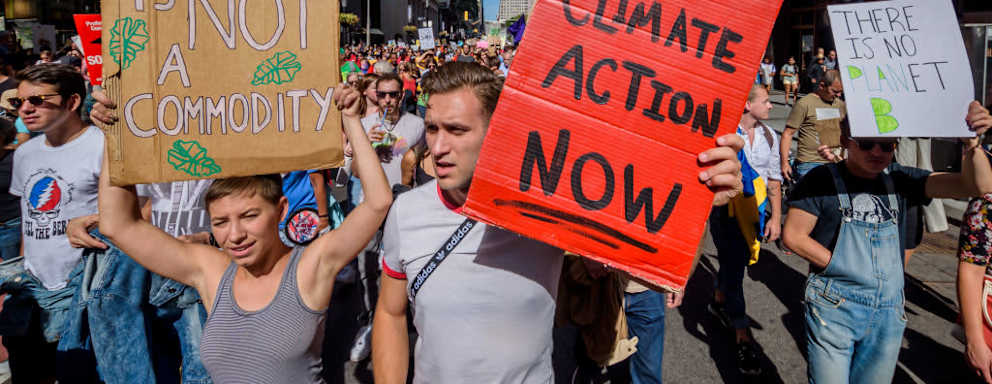Student Activists Plan Global Climate Strikes
 Credit: Erik McGregor / Contributor / LightRocket / Getty Images
Credit: Erik McGregor / Contributor / LightRocket / Getty Images- On March 25, students across the globe will again take to the streets to demand action on climate change.
- Longstanding demands include cutting emissions, divesting from fossil fuels, and making reparations.
- The #PeopleNotProfit focus of the upcoming strike confronts “colonialism, extractivism and capitalism.”
Fridays for Future is back as students across the world ramp up their demands for action on climate change. The pandemic put a damper on climate strikes, but last October’s #UprootTheSystem strike saw a spike in global participation, on par with turnout from 2019. The next strike, #PeopleNotProfit, is scheduled for March 25.
— Fridays For Future (@Fridays4future) January 25, 2022📢 ON MARCH 25TH, WE WILL STRIKE FOR CLIMATE REPARATIONS AND JUSTICE!📢
Join us for the Global Climate Strike as we demand policymakers and world leaders to prioritize #PeopleNotProfit!
Find out more: https://t.co/4vSZMw5LoT#FridaysForFuture
Design made by: @namevdelangpic.twitter.com/7RQPIXxhbP
Inspired by Swedish climate activist Greta Thunberg, Fridays for Future is a youth movement that has organized 16 global strikes since late 2018, three months after Thunberg began her “Skolstrejk för klimatet” — school strike for climate. Following Thunberg’s example, students who wish to participate skip school or walk out.
Days after the start of spring in the Northern hemisphere, the March 25 strike includes 72 registered events (and counting) in the U.S. In October, the U.S. had the second largest number of strikes planned of countries worldwide, with 114 on the calendar.
The #PeopleNotProfit theme of the upcoming strike demands that “the richest capitalist 1%” be held responsible for “centuries of exploitation and oppression” and that wealth, technology, and political power be redistributed and collectivized among “Indigenous, black, anti-patriarchal and diverse marginalized communities.”
“Colonizers and capitalists are at the core of every system of oppression that has caused the climate crisis,” Fridays for Future proclaims, “and decolonization, using the tool of climate reparations, is the best kind of climate action.”
Climate Anxiety and Social Justice Shape Demands
According to a survey carried out by researchers at the University of Bath, nearly half of global youth (45%) reported experiencing “climate anxiety and distress,” which impacted their daily lives. A full 75% said that “the future is frightening.”
The majority of young people surveyed also said they believe governments are not doing enough to address climate change (64%) and that they are “betraying me and/or future generations” as a result (58%). This survey polled 10,000 young people (ages 16-25) from across 10 countries.
The list of demands that recent climate strikes level at global leaders include drastically cutting emissions, divesting from fossil fuels, and producing plans to achieve net-zero carbon emissions. Other demands include providing reparations for MAPA (most affected peoples and areas), distributing COVID-19 vaccines equitably, and removing intellectual property restrictions related to COVID-19 technologies.
Fridays for Future considers these steps to be part of repaying the “climate debt” that the Global North owes the Global South. Though responsible for a disproportionate amount of historic emissions, the Global North has avoided many of the worst impacts of industrialization and extreme weather. The strike calls for “anti-racist climate reparations,” the cancellation of debts caused by extreme weather events, and the protection of climate refugees under international law.
Youth Increasingly Desperate for Climate Action
Last fall’s strikes strategically aligned with the United Nations General Assembly meeting and the UN Climate Change Conference, held in Scotland. The September strike also occurred just days ahead of important federal elections in Germany.
Climate anxiety reached a new pitch in Germany as 2021 drew to an end. Increasingly desperate protests included blocking autobahns, setting luxury cars on fire, and refusing to eat. Beginning Aug. 30, six young Germans who consider themselves part of “the last generation which has a chance to halt climate change,” went on a hunger strike. The group said they were prepared to starve to death. The hunger strike ended in late September after 27 days and no response from politicians.
Unimpressed with the climate policies of their country’s main political parties, these activists do not believe that Germany’s Green party is green enough. True to Fridays for Future’s chosen hashtag for last year’s strikes, many young Germans want to #UprootTheSystem.
In the U.S., young people have taken up Thurnberg’s tradition at statehouses and college campuses. A band of teenagers gained notoriety for gathering almost every Friday in front of the Utah State Capitol, hoping to awaken adults in general — and elected officials in particular — to the dangers of “climate chaos.”
Successful protests have also been held at Harvard University, where climate activists scored a big victory when the university announced it would divest it’s endowment from fossil fuel investments.
Feature Image: Erik McGregor / Contributor / LightRocket / Getty Images